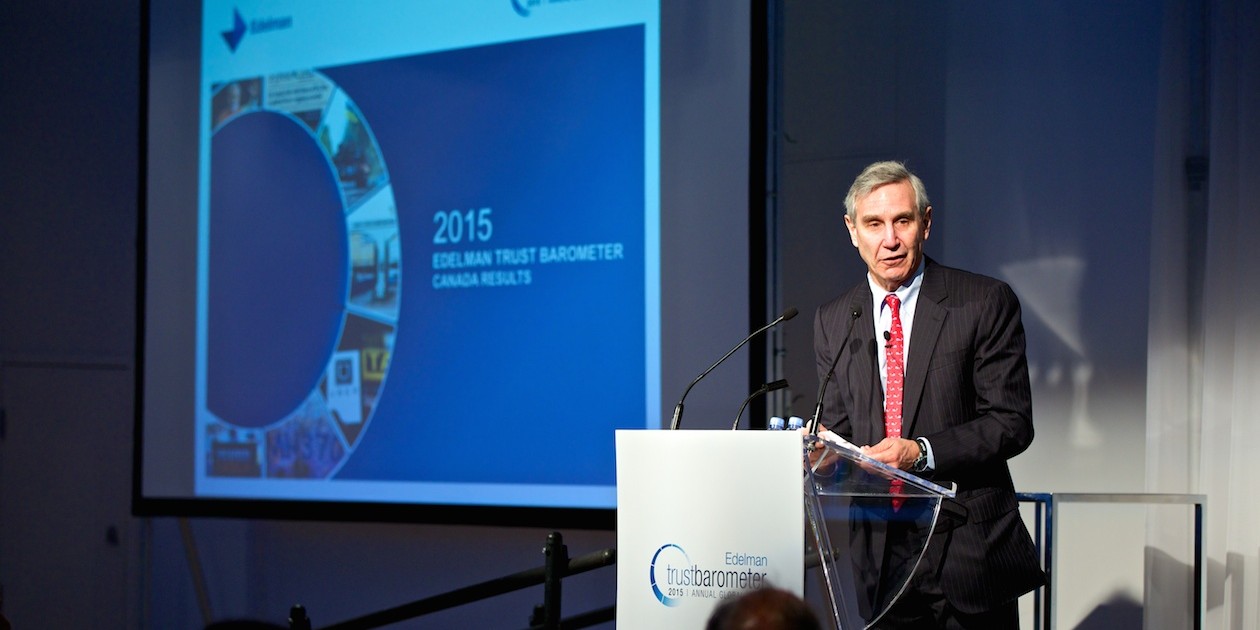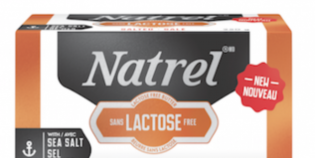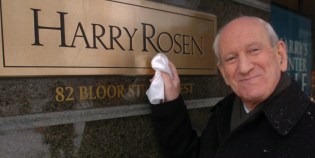Consumer trust in Canada is down across the board. Canadians are losing trust in businesses, media and the government, according to findings from Edelman‘s 15th annual Trust Barometer study.
Trust in business has been hit the hardest, with less than half (47%) of Canadians reporting they trust businesses – a sharp 15 point drop from Edelman’s 2014 study.
Globally, consumer trust was hit by a “long series of scandals for big companies,” such as the Sony hacking and the Malaysia Airlines crashes, Edelman CEO Richard Edelman told the audience at an event in Toronto where he presented the study findings Tuesday morning. In Canada, the CBC’s Jian Ghomeshi scandal, the shootings on Parliament Hill and high volume of auto recalls also caused consumers to lose faith in institutions.
Edelman called the global scandals and unrest, “the perfect storm of insecurity.”
One of the main reasons the study found consumers are losing trust in businesses, however, was not a particular event but the pace of innovation. More than half (43%) of Canadians think the pace of innovation is too fast and reported they believe the reasons businesses are pushing innovation forward are disingenuous.
Rather than positive social change or even better products, Canadians believe business innovation is driven almost entirely by corporate self-interest. Three quarters of Canadians said they believe greed is the reason businesses seek innovation and even more (80%) reported the need to hit growth targets as a main driver.
The “move fast and break things” attitude of tech leaders like Mark Zuckerberg is not sitting well with consumers, according to Edelman Canada CEO and chair John Clinton, who recently added North American head of creative and content to his title. “Canadians are saying, ‘No, not so fast,'” he said.
Richard Edelman echoed Clinton’s sentiment, explaining consumers do not share the belief of Silicon Valley’s corporate heros like Jeff Bezos, who has previously equated innovation to social good, stating plainly, “New inventions and things that customers like are usually good for society.”
In fact, Edelman said the Trust Barometer has shown the inverse is true. Put simply, “people think innovation is happening too fast and it makes them uncomfortable,” he said.
Still, trust in technology companies overall in Canada is high (74%), which means consumers’ distrust of innovation hasn’t caused them to lose faith in the tech sector at large. Particular innovations, like mobile and digital payments, have also been deemed trustworthy, with 69% of Canadians trusting online payment tools.
Trust in corporate leaders is also falling, especially in Canada, where just 34% of consumers reported that they trust CEOs – matching Germany for the country with the least trust in CEOs globally.
How can companies and their leaders regain trust? Clinton said transparency and a willingness to work with governments is key. Sharing the results of tests of new products, for example, may help consumers get behind innovations, Clinton said. In Canada, complying with government regulation is especially important, as 42% of Canadians think the government needs more regulation of business – a far greater chunk than in places like the U.S.
The media didn’t fare any better than businesses in the Trust Barometer, with less than half of Canadians (47%) reporting they have trust in the media, down from 58% in the 2014 report. One of the major factors in the distrust is the Jian Ghomeshi scandal, which broke during the survey period last fall.
Clinton said the “dispersion of media” and change in which voices Canadians find authoritative will have a big impact on marketing and public relations. While Canadians are losing trust in businesses and other institutions, they still trust friends and family, which means marketers should invest in word-of-mouth marketing, influencer programs and social media.
That doesn’t mean, however, they should abandon traditional media relations. The reality, Clinton said, is that a mix of media, both traditional and non, is needed as trust changes and Canadians look to a variety of sources for information.
The Trust Barometer survey was completed in the fall of 2014 and included interviews with 33,000 consumers, including 1,200 Canadians.










